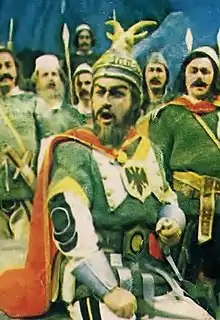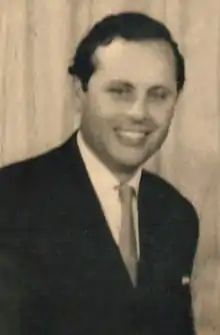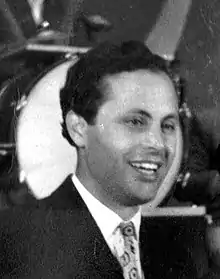Xhoni Athanas
Xhoni Athanas (November 4, 1925 - October 1, 2019),[1] also known as Gjoni Athanas or John Athanas, was a famous Albanian operatic tenor. He received numerous awards in his long career as an opera singer, including Artist i Merituar (Merited Artist), Medalja e Mirnjohjes (Medal of Gratitude), Mjeshter i Madh (Great Master), all awarded by the Albanian Presidents, and Lifetime achievement award[2] awarded by the Albanian-American organization AANO in Boston.


He is remembered for his extraordinary interpretation of the role of Scanderbeg in the opera Skenderbeu[3] by the Albanian composer Prenk Jakova.
Early life
Xhoni was born on November 4, 1925, in Brockton, Massachusetts. His parents, Olympia and Thanas, both of Albanian origin, lived in America as immigrants for almost 20 years and returned to Albania in 1927 in the region of Korca, when Xhoni was only 2 years old. From 1927 to 1994 Xhoni lived in Albania. In 1994 he returned to America where he lived until the end of his life.
From an early age, he started to sing Byzantine psalms in the Christian Orthodox Church of Grapsh, a small village in the region of Korca, Albania, where his father served as a minister, as well as Korca's folk songs, which served as a foundation for his vocal education and increased his passion for singing and the art of music. His father, a minister when Xhoni was living in Albania, had a musical education, he sang himself every night in the church where he practiced and also played the clarinet when he lived in America. He noticed that his son's voice was a gift and encouraged him to follow his talent.
In 1940 Xhoni moved to the city of Korca to pursue his dream of becoming a singer. During his time in Korca, he earns valuable experience while participating as a soloist with the Motropolia Chorus and the Group "Lira". He was recognized at the time as a tenor with a beautiful and powerful voice. He moves to Tirana in 1947, where he gets involved with the Albanian Military Chorus, under the care of director Gaqo Avrazi,. The Chorus toured in Albania and in many Eastern European countries. During these tours, Athanas earned significant recognition, while interpreting as a soloist and along with Avni Mula, Ibrahim Tukici, Mentor Xhemali, Luk Kacaj, Ndrek Gjergji, and Maliq Herri, among others.
Education and career

In 1952, he was selected as one of the best talents in Albania and earned a scholarship to study at the Tchaikovsky Conservatory in Moscow as an operatic tenor.[4] He studied with Professor Alexander Baturin. At the end of his studies in 1957 he was awarded the second prize in the International Contest of new operatic voices in Moscow, competing against 110 participants from all over the world. He received the Honorary Degree signed by well known tenor Tito Schipa, then director of the Jury.

After finishing his studies, he returns to Tirana, and started his career at the Teatri i Operas dhe Baletit. During his career there, he is distinguished in the roles of Turidu from Mascagni's Cavalleria rusticana, Canio from Leoncavallo's Pagliacci, Lenskey from Tchaikovsky's Eugene Onegin, Schaunard from Puccini's La bohème, Don Basilio from Mozart's The Marriage of Figaro, Dhimitri from K. Konos' Lulja e kujtimit, Bash Murgjini from A. Mula's Borana, Kuestori from V. Nova's Heroina, and Doda from P. Jakova's Mrika, among others. Apart from interpreting as a soloist at the Theater of Opera in Tirana, he also participated in hundreds of activities, concerts and tours around the world. He toured in Romania, Soviet Union, China, Mongolia, Korea, Vietnam, Bulgaria, Ukraine, Lithuania, Yugoslavia, and Hungary. The stage loved him and he loved the stage, everywhere he performed he brought his voice and artistic talent to the wider audience with excellence and an extraordinary ability to communicate with people which often earned him standing ovations. Among others, the Moscow newspaper Culture in 1959 writes: “Every theater in the world would be honored to have a tenor like John Athanas". Brymorov, a well-known professor from the Bulgarian Conservatory has praised the voice of Athanas as “a rare voice that deserves worldly respect”. Toti dal Monte, a famous Italian soprano, said after listening to him in one of the studios in Moscow: “Athanas is a rare voice of a dramatic tenor".
In 1960 he married Sekine Sharofi Athanas, a classical ballerina.. He has two daughters, Mirela and Edlira, niece Juia and nephew Easton J.
From his personal diary, written between 1957 and 1993, there is a count of 1100 concerts and 450 operatic performances. But the role that raised him in the pedestal of his artistic performance was the role of Scanderbeg, in the Albanian Opera Skenderbeu by Prenk Jakova. Scanderbeg is regarded as Albania's greatest hero. Jakova admired Athanas' voice and wrote the opera particularly for his dramatic voice. Scanderbeg, staged in 1967 by the Theater of Opera of Tirana, gave Athanas the role of his life, the one role he dedicated so much time preparing for, since it was not only important to interpret it vocally but more importantly the image and strength of the legendary Hero needed to be portrayed truthfully. He studied many books and stories written about Scanderbeg. In the days preparing for the role of Scanderbeg, he found himself not only preparing as a vocalist, but as an actor who prepares for a difficult role, and in a very short time, he not only studied the notes but every single move, in accordance to what he had read about the hero and achieved the success of his life. When he entered the stage, his tall and energetic figure, his acting and his powerful voice were a completion of this legendary role, so much so that it looked as if the real Scanderbeg entered the stage. Pictures of him interpreting the role have been used to illustrate Scanderbeg in history lessons.
Later career
He was a professor of bel canto at the Academy of Arts in Tirana for about 20 years. He also directed the staging of scenes from the operas Norma, Rigoletto, Tosca, Madama Butterfly, and Carmen in the 1990s. Additionally, he worked on a few books on singing techniques, such as Singing, A Way of Expression and Communication and The Breathing Techniques for the Singer. He also worked on a book collecting rare Albanian folk songs. He regards this experience where he had to visit many forgotten villages of Albania and find these songs, as one of the best experiences of his life.
Later life
In 1994, he returned to Brockton to visit the house where he was born and lived for the first 2 years of his life in. This proved to be an emotional visit for him, as he had never thought that it would happen in his lifetime due to constrictions put in place from the regime of the Albanian government during 1944–1990. He was awarded the Medallion of Gratitude from the President of Albania in 2006 for his long singing career and for the interpretation of the role of Scanderbeg and in recognition of his involvement with the Albanian community of Boston, where he performed continuously in gatherings and events. He also performed numerous times for the Russian and the Italian community of Boston. His last stage appearance was in September 2012 at the age of 87 years old, in celebration of Albanian's 100 years of independence concert in Boston, for the Albanian community, where, accompanied in piano by his daughter Mirela Athanas, he performed Lirine s'ua solla une, Scanderbeg's aria, for the final time. He received the titles of Merited Artist (Artist i Merituar) and Great Master (Mjeshter i Madh) for his interpretations in Tirana, Albania. In 2015, he was awarded the Lifetime Achievement Award from the organization of AANO in Boston.
He died peacefully on October 1, 2019 at the age of 93, one month before his 94th birthday, after a two-year period of ailing health surrounded by his loving family and the love of his wife, daughter, niece, and nephew. At the day of his burial, his recording of Beethoven's In questa tomba oscura accompanied him to his final resting place. His final resting place is located in Winchester, Massachusetts.[5] [6] [7] [8] [9] [10] [11] [12] [13]
References
- Athanas, Xhoni. "Life Time achievement Award" (PDF). Albanian American National Organization. Trumbeta Shqiptare. Retrieved 2021-11-03.
- Athanas, Xhoni. "Life Time achievement Award". Albanian American National Organization.
- Athanas, Gjoni. "TKOB: "Gjergj Kastrioti Skenderbeu"". www.sot.com.al. Sot.com.al. Retrieved 2021-11-06.
- Athanas, Xhoni. "Artisti Xhoni Athanas". www.alva.al. alva.al. Retrieved 2021-11-06.
- Plus, Kult. "Xhoni Athanas".
- "In Memoriam: "XHONI ATHANAS, NJERIU DHE ARTISTI" Nga Skifter Këlliçi*". October 5, 2019.
- "Gjoni Athanas Discography - Albania - 45cat". www.45cat.com.
- "Xhoni Athanas, njeriu dhe artisti". Bota Sot.
- "Awards". Albanian American National Organization.
- Christo, Van. "MUST SEE! An evening of Albanian classical music and poetry | The Frosina Information Network".
- "TKOB: "Gjergj Kastrioti Skënderbeu", a great work in the operatic genre". sot.com.al.
- "Biografi: Gjoni Athanas në historinë operistike | Arteka.al". arteka.al.
- Athanas, Xhoni. "Politics, Personhood, and Cultural Production in Tirana, Albania (1944-present)" (PDF). Stony Brook University. Stony Brook University. Retrieved 2021-11-03.